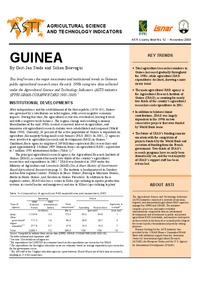Authors:
Stads, Gert-Jan; Béavogui, Sékou
Year:
2003
Publisher
International Food Policy Research Institute (IFPRI); International Service for National Agricultural Research (ISNAR); and Agricultural Research Institute of Guinea (IRAG)
Back to:
Compared with neighboring countries, agricultural R&D in Guinea is characterized by a low level of highly qualified (masters- and doctoral-level) research staff, by much lower expenditures per researcher, and by a very low support-staff-to-researcher ratio. Since the beginning of the 1990s, agricultural researcher numbers have gradually increased in Guinea, but agricultural research budgets have been erratic and strongly dependent on two consecutive projects—PSA-1 and PNSA— funded by World Bank loans, counterpart funding from the government of Guinea, and donor funding from France and the European Union. The completion of PNSA in December 2000 and of FAC funding in June 2003 has left a bleak financial situation, particularly for IRAG, which has been forced to dramatically cut research activities of 21 out of its 32 research programs. Without new donor projects or funding from producer organizations or private enterprises, the Guinean government will have to substantially increase its funding to IRAG if it wants IRAG to survive this severe financial crisis.

